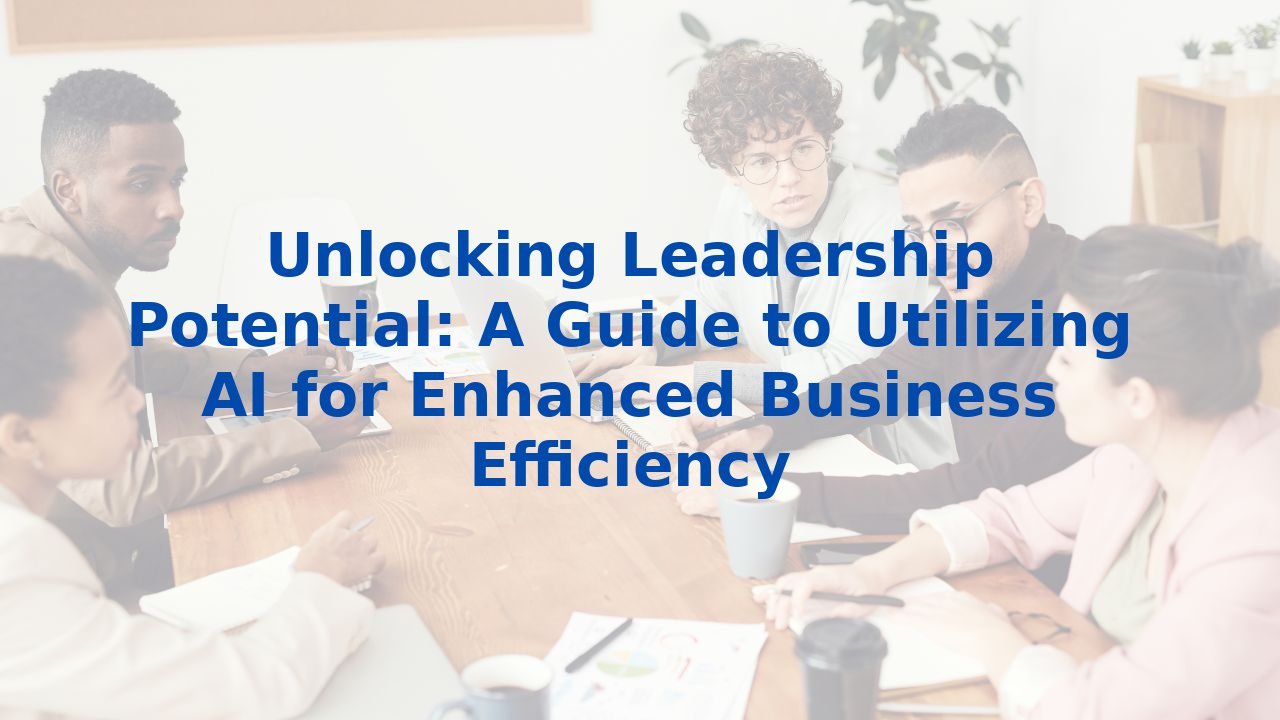Unlocking Leadership Potential: A Guide to Utilizing AI for Enhanced Business Efficiency
Unlocking Leadership Potential: A Guide to Utilizing AI for Enhanced Business Efficiency
In an era where speed and precision dictate success, organizations are on a relentless quest to refine their operations. The evolution of Artificial Intelligence (AI) marks a pivotal moment in this journey. AI is not just a tech trend; it’s a transformative force capable of reshaping the way businesses function, unlocking unprecedented levels of efficiency and productivity.
1. Automating Routine Tasks
The true beauty of AI is its capacity to take the mundane off our hands. Imagine a world where data entry, invoice processing, and appointment scheduling happen without human intervention. AI-powered bots can automate these repetitive tasks, drastically reducing room for error. This shift enables employees to redirect their energy toward strategic initiatives that foster innovation and growth.
2. Process Optimization
Every organization has processes that can be fine-tuned. AI excels in analyzing workflows to pinpoint bottlenecks and inefficiencies. With its analytical prowess, AI provides insights allowing businesses to restructure operations intelligently. By automating manual tasks and reallocating resources, organizations can forge a streamlined path toward productivity that previously seemed out of reach.
3. Quality Control and Assurance
Quality is non-negotiable in any industry. AI brings to the table advanced quality control analytics that monitor manufacturing processes in real-time. It has the ability to detect defects early, ensuring that only the best products reach the market. This not only amplifies product quality but also protects the brand’s reputation, reducing waste while enhancing consumer trust.
4. Risk Management
In the business world, a clear picture of risks and opportunities is invaluable. AI presents organizations with a comprehensive view of potential threats by examining multifaceted data relationships. It can identify emerging trends, evaluate market volatility, and even foresee future scenarios. Such insights empower businesses to not just react to but proactively navigate challenges, building a resilient and adaptable enterprise.
5. Supply Chain Management
A responsive supply chain can be a business's greatest asset. By leveraging historical and real-time data, AI predicts demand fluctuations and optimizes inventory. It suggests efficient shipping routes, minimizes carrying costs, and reduces delays. The result? A supply chain that not only adapts seamlessly to changes but also significantly enhances operational efficiency.
6. Employee Training and Productivity
The integration of AI into the workplace extends beyond technology—it’s fundamentally about enhancing human capability. AI-driven learning platforms reshape employee training, offering customized content that respects individual learning styles. These platforms present solutions in real-time, boosting not only knowledge retention but also an employee’s ability to tackle problems independently. When equipped with AI insights, employees become empowered decision-makers, driving productivity across the organization.
7. Fraud Detection
Security is a crucial component in today’s digital landscape, and AI shines by identifying patterns within vast datasets. It can swiftly detect deviations in transaction data and user behaviors, thus flagging fraudulent activities before they escalate. This advanced layer of protection safeguards company assets and reassures customers, maintaining trust in your brand.
The Benefits of Training Employees for AI
Maximizing the potential of AI requires more than just its implementation; it necessitates comprehensive employee training. Here’s how training can elevate your organization:
- Understanding AI Capabilities: Training empowers employees to leverage AI tools effectively, ensuring that organizations can realize its full benefits.
- Collaboration with AI Systems: Equipped with knowledge, employees can integrate AI seamlessly into their workflows, which enhances overall efficiency.
- Enhanced Problem-Solving: With a foundation in AI, employees sharpen their analytical skills, making informed, data-driven decisions.
- Adaptability: Cultivating an AI-literate workforce prepares organizations to embrace change and thrive amidst technological advancements.
Conclusion
As businesses navigate the complexities of modern operations, AI emerges as a powerful ally. From automating routine tasks and optimizing processes to enhancing quality control, AI can significantly drive efficiency. Empowering employees through AI training is crucial—it's about creating synergy between human intuition and machine intelligence. The question is no longer whether to adopt AI, but rather how rapidly and effectively organizations can integrate it into their DNA. Embracing this change is not merely a choice but a necessity for sustained growth and competitive advantage in today’s fast-paced world.
To learn more about how to equip your workforce with essential AI skills, consider exploring comprehensive training solutions that enhance not only individual capabilities but also the organization's operational framework. Only through shared understanding can we unlock the vast potential that AI offers.
Understanding and integrating AI within your organization is the key to staying not just relevant, but thriving in an ever-evolving landscape.



